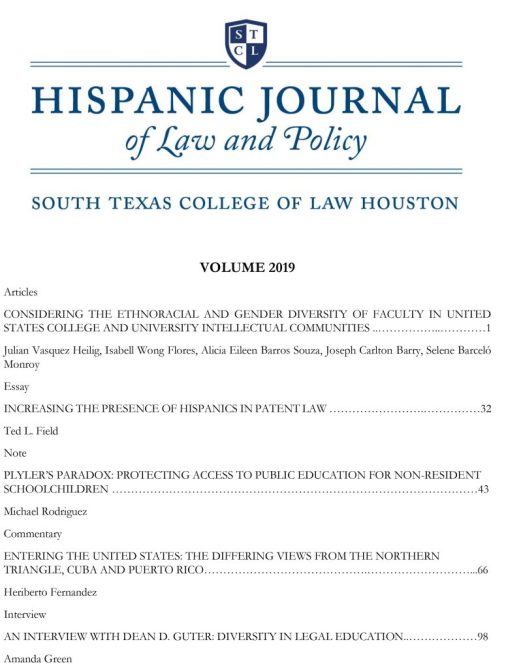NEW STUDY: FACULTY DIVERSITY GAINS IN U.S. COLLEGES AND UNIVERSITIES LARGELY MINIMAL

We are honored to announce a NEW article entitled Considering the Ethnoracial and Gender Diversity of Faculty in US College and University Intellectual Communities about faculty diversity in the The Hispanic Journal of Law and Policy (THJLP). THJLP is a law journal at South Texas College of Law Houston. Its purpose is to inform and significantly impact the Hispanic legal community in Texas and across the nation.

Diversity, equity and inclusion should be widely promoted across disciplines, colleges, and a university’s intellectual community to positively impact educational practices and outcomes. It is important that our nation’s college and universities centrally value gender and ethnoracial diversity that fits within the framework of the law in the admissions processes and the recruitment and employment of faculty, two areas uniquely separate and distinct in their legal analyses. Notably, propositions, legislation and judicial decisions have challenged policies crafted to increase diversity in education in some states, particularly, in the context of admissions in higher education, while the U.S. Supreme Court has allowed race to be considered as a “plus” factor. Considering the legal context surrounding higher education admissions, it is important for leaders and administrators in higher education to understand whether universities and colleges have advanced greater diversity among faculty given this legal environment. Our discussion focuses on what higher education leaders are facing with respect to faculty diversity given the legal context surrounding affirmative action and admissions processes. We note differences in gender and ethnoracial diversity by institution type (Bachelor’s, Master’s and Doctoral). We also find that in recent years, gains in faculty diversity in U.S. college and university intellectual communities were largely minimal.
Please read and share this new piece widely. Our academic leaders and scholarly communities need to make more progress in diversifying our nation’s faculty.
Vasquez Heilig. J., Flores, I., Souza, A., Barry, J., & Barcelo Monroy, S. (2019). Considering the Ethnoracial and Gender Diversity of Faculty in US College and University Intellectual Communities. Hispanic Journal of Law and Policy, 2(1), 1-31.
Please Facebook Like, Tweet, etc below and/or reblog to share this discussion with others.
For more published and peer reviewed research check out and follow my Academia.edu channel here.
Twitter: @ProfessorJVH
Click here for Vitae.




























